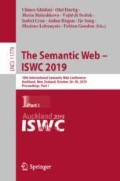Abstract
In the distributed ontology alignment construction problem, two agents agree upon a meaningful subset of correspondences that map between their respective ontologies. However, an agent may be tempted to manipulate the negotiation in favour of a preferred alignment by misrepresenting the weight or confidence of the exchanged correspondences. Therefore such an agreement can only be meaningful if the agents can be incentivised to be honest when revealing information. We examine this problem and model it as a novel mechanism design problem on an edge-weighted bipartite graph, where each side of the graph represents each agent’s private entities, and where each agent maintains a private set of valuations associated with its candidate correspondences. The objective is to find a matching (i.e. injective or one-to-one correspondences) that maximises the agents’ social welfare. We study implementations in dominant strategies, and show that they should be solved optimally if truthful mechanisms are required. A decentralised version of the greedy allocation algorithm is then studied with a first-price payment rule, proving tight bounds on the Price of Anarchy and Stability.
Access this chapter
Tax calculation will be finalised at checkout
Purchases are for personal use only
Notes
- 1.
For a comprehensive overview of the different approaches, we refer the reader to the Ontology Alignment Evaluation Initiative - http://oaei.ontologymatching.org.
- 2.
A classic example of terminological difference exists with the term “football”, which has a different meaning depending on whether the reader is from the US or the UK.
- 3.
We follow the standard practice of restricting ourselves to correspondences between named concepts within the respective ontologies [10], and omit the discussion of the property relations between entities within each ontology.
- 4.
The notion of a bid profile across a set of agents that omits the bid of agent i, represented as \(b_{-i}\) originates from the definition of the Vickrey Clarke Groves (VCG) mechanism [25], used extensively in mechanism design.
References
Adamczyk, M., Sankowski, P., Zhang, Q.: Efficiency of truthful and symmetric mechanisms in one-sided matching. In: Lavi, R. (ed.) SAGT 2014. LNCS, vol. 8768, pp. 13–24. Springer, Heidelberg (2014). https://doi.org/10.1007/978-3-662-44803-8_2
Anshelevich, E., Das, S., Naamad, Y.: Anarchy, stability, and utopia: creating better matchings. Auton. Agent. Multi-Agent Syst. 26(1), 120–140 (2013)
Atencia, M., Schorlemmer, W.M.: An interaction-based approach to semantic alignment. J. Web Semant. 12, 131–147 (2012)
Bhawalkar, K., Roughgarden, T.: Welfare guarantees for combinatorial auctions with item bidding. In: Proceedings of the Twenty-Second Annual ACM-SIAM Symposium on Discrete Algorithms, pp. 700–709. SIAM (2011)
Briest, P., Krysta, P., Vöcking, B.: Approximation techniques for utilitarian mechanism design. In: STOC, pp. 39–48 (2005)
Chocron, P., Schorlemmer, M.: Vocabulary alignment in openly specified interactions. In: International Conference on Autonomous Agents and Multi-Agent Systems (AAMAS), pp. 1064–1072 (2017)
Christodoulou, G., Kovács, A., Schapira, M.: Bayesian combinatorial auctions. In: Aceto, L., Damgård, I., Goldberg, L.A., Halldórsson, M.M., Ingólfsdóttir, A., Walukiewicz, I. (eds.) ICALP 2008. LNCS, vol. 5125, pp. 820–832. Springer, Heidelberg (2008). https://doi.org/10.1007/978-3-540-70575-8_67
Dobzinski, S., Nisan, N., Schapira, M.: Approximation algorithms for combinatorial auctions with complement-free bidders. In: Proceedings of the Thirty-Seventh Annual ACM Symposium on Theory of Computing, pp. 610–618. ACM (2005)
Euzenat, J.: Interaction-based ontology alignment repair with expansion and relaxation. In: Proceedings of the Twenty-Sixth International Joint Conference on Artificial Intelligence, IJCAI 2017, pp. 185–191 (2017)
Euzenat, J., Shvaiko, P.: Ontology Matching, 2nd edn. Springer, Heidelberg (2013). https://doi.org/10.1007/978-3-642-38721-0
Feldman, M., Fu, H., Gravin, N., Lucier, B.: Simultaneous auctions are (almost) efficient. In: Proceedings of the Forty-Fifth Annual ACM Symposium on Theory of Computing, pp. 201–210. ACM (2013)
Grau, B.C., Motik, B.: Reasoning over ontologies with hidden content: the import-by-query approach. J. Artif. Intell. Res. 45, 197–255 (2012)
Gruber, T.R.: A translation approach to portable ontology specifications. Knowl. Acquis. 5(2), 199–220 (1993)
Gusfield, D., Irving, R.W.: The Stable Marriage Problem: Structure and Algorithms. MIT Press, Cambridge (1989)
Jiménez-Ruiz, E., Payne, T.R., Solimando, A., Tamma, V.: Limiting consistency and conservativity violations through negotiation. In: The 15th International Conference on Principles of Knowledge Representation and Reasoning (KR 2016), pp. 217–226 (2016)
Jiménez-Ruiz, E., Meilicke, C., Grau, B.C., Horrocks, I.: Evaluating mapping repair systems with large biomedical ontologies. In: 26th International Workshop on Description Logics, July 2013
Krysta, P., Manlove, D., Rastegari, B., Zhang, J.: Size versus truthfulness in the house allocation problem. In: Proceedings of the Fifteenth ACM Conference on Economics and Computation, pp. 453–470. ACM (2014)
Kuhn, H.W.: The Hungarian method for the assignment problem. Naval Res. logist. Q. 2(1–2), 83–97 (1955)
Laera, L., Blacoe, I., Tamma, V., Payne, T., Euzenat, J., Bench-Capon, T.: Argumentation over ontology correspondences in MAS. In: International Conference on Autonomous Agents and Multi-Agent Systems (AAMAS), pp. 1285–1292 (2007)
Lehmann, D.J., O’Callaghan, L., Shoham, Y.: Truth revelation in approximately efficient combinatorial auctions. J. ACM 49(5), 577–602 (2002)
Lucier, B., Borodin, A.: Price of anarchy for greedy auctions. In: Proceedings of the Twenty-First Annual ACM-SIAM Symposium on Discrete Algorithms, pp. 537–553. Society for Industrial and Applied Mathematics (2010)
Meilicke, C., Stuckenschmidt, H.: Analyzing mapping extraction approaches. In: Proceedings of the 2nd International Conference on Ontology Matching, pp. 25–36 (2007)
Mitra, P., Lin, P., Pan, C.: Privacy-preserving ontology matching. In: AAAI Workshop on Context and Ontologies, vol. WS-05-01, pp. 88–91 (2005)
Mu’alem, A., Nisan, N.: Truthful approximation mechanisms for restricted combinatorial auctions. Games Econ. Behav. 64(2), 612–631 (2008)
Nisan, N., Roughgarden, T., Tardos, E., Vazirani, V.V.: Algorithmic Game Theory, vol. 1. Cambridge University Press, Cambridge (2007)
Payne, T.R., Tamma, V.: Negotiating over ontological correspondences with asymmetric and incomplete knowledge. In: International Conference on Autonomous Agents and Multi-Agent Systems (AAMAS), pp. 517–524 (2014)
Shvaiko, P., Euzenat, J.: Ontology matching: state of the art and future challenges. IEEE Trans. Knowl. Data Eng. 25(1), 158–176 (2013)
Author information
Authors and Affiliations
Corresponding author
Editor information
Editors and Affiliations
Rights and permissions
Copyright information
© 2019 Springer Nature Switzerland AG
About this paper
Cite this paper
Zhi, N., Payne, T.R., Krysta, P., Li, M. (2019). Truthful Mechanisms for Multi Agent Self-interested Correspondence Selection. In: Ghidini, C., et al. The Semantic Web – ISWC 2019. ISWC 2019. Lecture Notes in Computer Science(), vol 11778. Springer, Cham. https://doi.org/10.1007/978-3-030-30793-6_42
Download citation
DOI: https://doi.org/10.1007/978-3-030-30793-6_42
Published:
Publisher Name: Springer, Cham
Print ISBN: 978-3-030-30792-9
Online ISBN: 978-3-030-30793-6
eBook Packages: Computer ScienceComputer Science (R0)


